Related Research Articles
The Book of Zechariah is a Jewish text attributed to Zechariah, a Hebrew prophet of the late 6th century BC. In the Hebrew Bible, the text is included as part of the Twelve Minor Prophets, itself a part of the second division of that work. In the Christian Old Testament, the Book of Zechariah is considered to be a separate book.
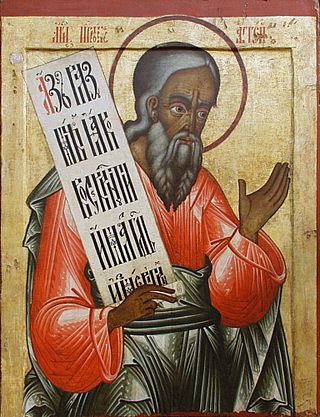
Haggai or Aggeus was a Hebrew prophet during the building of the Second Temple in Jerusalem, and one of the twelve minor prophets in the Hebrew Bible and the author of the Book of Haggai. He is known for his prophecy in 520 BCE, commanding the Jews to rebuild the Temple. He was the first of three post-exile prophets from the Neo-Babylonian Exile of the House of Judah |Zechariah]], his contemporary, and Malachi, who lived about one hundred years later), who belonged to the period of Jewish history which began after the return from captivity in Babylon. His name means "my holidays."
Malachi, also known as Malachias, is the name used by the author of the Book of Malachi, the last book of the Nevi'im (Prophets) section of the Tanakh. According to the 1897 Easton's Bible Dictionary, it is possible that Malachi is not a proper name; because it simply means "messenger", many assume it to be a pseudonym. Jewish tradition states that the real identity of Malachi is Ezra the scribe.
Zephaniah is the name of several people in the Hebrew Bible; the most prominent being the prophet who prophesied in the days of Josiah, king of Judah and is attributed a book bearing his name among the Twelve Minor Prophets. His name is commonly transliterated Sophonias in Bibles translated from the Vulgate or Septuagint. The name might mean "Yahweh has hidden/protected," or "Yah lies in wait". The church father Jerome interpreted the name to mean "the watchman of the Lord".
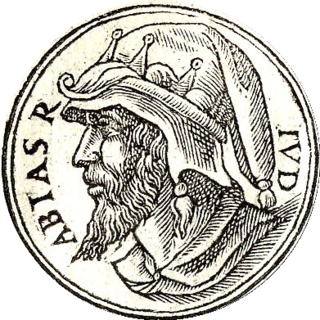
Abijam was, according to the Hebrew Bible, the fourth king of the House of David and the second of the Kingdom of Judah. He was the son of Rehoboam and the grandson of Solomon. The Books of Chronicles refer to him as Abijah.

Adoniram, the son of Abda, was the tax collector in the United Kingdom of Israel for over forty years, from the late years of King David's reign until the reign of Rehoboam. In the language of the Tanakh, he was "over the tribute", i.e. the levy or forced labor.
Ahijah is a name of several biblical individuals:
- Ahijah the Shilonite, the Biblical prophet who divided the Kingdoms of Israel and Judah.
- One of the sons of Bela. In AV (KJV) called "Ahiah."
- One of the five sons of Jerahmeel, who was great-grandson of Judah.
- A Pelonite, one of David's heroes ; called also Eliam.
- A Levite having charge of the sacred treasury in the temple.
- One of Solomon's secretaries.
- Son of Ahitub, Ichabod's brother; the same probably as Ahimelech, who was High Priest at Nob in the reign of Saul and at Shiloh, where the Tabernacle was set up. Some, however, suppose that Ahimelech was the brother of Ahijah, and that they both officiated as high priests, Ahijah at Gibeah or Kirjath-jearim, and Ahimelech at Nob.
- Father of King Baasha of Israel
Anakim are mentioned in the Bible as descendants of Anak.

The Illustrated Bible Dictionary, better known as Easton's Bible Dictionary, is a reference work on topics related to the Christian Bible, compiled by Matthew George Easton. The first edition was published in 1893, and a revised edition was published the following year. The most popular edition, however, was the third, published by Thomas Nelson in 1897, three years after Easton's death. The last contains nearly 4,000 entries relating to the Bible. Many of the entries in Easton's are encyclopedic in nature, although there are also short dictionary-type entries.
Zerah or Zérach refers to several people in the Hebrew Bible.
Ramoth-Gilead, was a Levitical city and city of refuge east of the Jordan River in the Hebrew Bible, also called "Ramoth in Gilead" or "Ramoth Galaad" in the Douay–Rheims Bible. It was located in the tribal territorial allotment of the tribe of Gad.
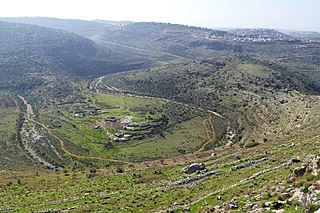
Mount Ephraim, or alternatively Mount of Ephraim, was the historical name for the central mountainous district of Israel once occupied by the Tribe of Ephraim, extending from Bethel to the plain of Jezreel. In Joshua's time, approximately sometime between the 18th century BCE and the 13th century BCE, these hills were densely wooded. They were intersected by well-watered, fertile valleys, referred to in Jeremiah 50:19.
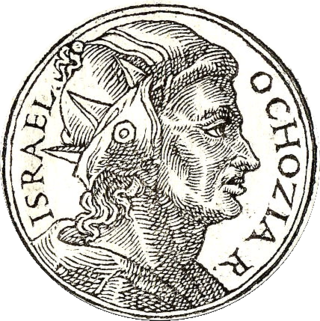
Ahaziah was the eighth king of the northern Kingdom of Israel and the son of Ahab and Jezebel. Like his father, he reigned from Samaria. William F. Albright has dated his reign to 850–849 BC, while E. R. Thiele offers the dates 853–852 BC.

Nadab was, according to the Hebrew Bible, the second king of the northern Israelite Kingdom of Israel. He was the son and successor of Jeroboam.
In ancient times, the Bereans were the inhabitants of the city of Berea, also referred to as Beroea in the Bible. Today, the city is known as Veria in what is today northern Greece. The name has been taken up by certain groups within Protestantism based on the Bereans' emphasis on apologetics and studying Scripture.
Hadadezer, son of Rehob, was king of Zobah or Sova, a Syrian kingdom that may have been in the Beqaa Valley, extended along the eastern side of the Anti-Lebanon mountains, reaching Hama to the north. Zobah exercised power throughout southern Syria and inevitably clashed with the expanding empire of Israel.
Shur is a location mentioned several times in the Hebrew Bible.
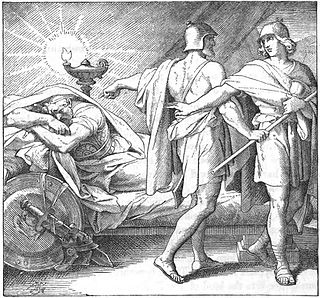
Abishai was a military leader under the biblical King David. He was the eldest son of David's sister Zeruiah. According to Josephus his father was called Suri. The meaning of his name is "Father of a gift". He was the brother of Joab and Asahel.
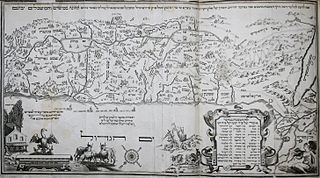
According to the Hebrew Bible, the Tribe of Asher was one of the Tribes of Israel descended from Asher, the eighth son of Jacob. It is one of the ten lost tribes.
References
![]() This article incorporates text from a publication now in the public domain : Easton, Matthew George (1897). "Ishtob". Easton's Bible Dictionary (New and revised ed.). T. Nelson and Sons.
This article incorporates text from a publication now in the public domain : Easton, Matthew George (1897). "Ishtob". Easton's Bible Dictionary (New and revised ed.). T. Nelson and Sons.